Christophe Ochs, Laurent Martinet and Olivier Dutertre did not wait for the buzz of the eco-responsible labels to replace ecology at the heart of their orchards. The three partners will market the 2019 harvest under the HEV level 3 certification. The label is only one step in their long-term strategy to combine biodiversity and profitability.
About Brun-Production and Brun-Conditionnement
“In 2011, one of our suppliers retired so we took over 150 hectares of orchards to maintain the production and become producers. This is how Brun-conditionnement and Brun-production were created as branches of Albafruit, with a sales office located in Moissac (Tarn-et-Garonne). Today, we produce apples and kiwis on over 150 hectares spread over four sites, which we store and package here. Ten of them are organic for apples, and four hectares are in conversion for kiwis,” explains Christophe.
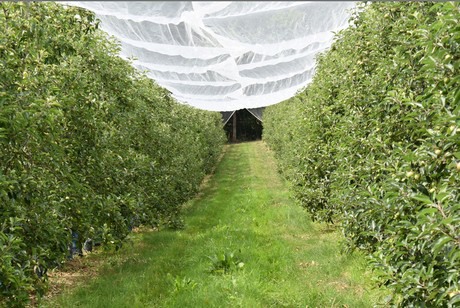 Pink Lady Orchard
Pink Lady Orchard
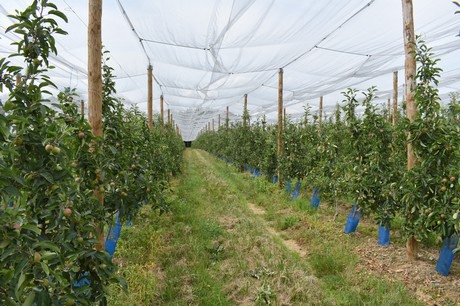 Replanted orchard after 3 years - Envy apples
Replanted orchard after 3 years - Envy apples
A “pampered” biodiversity
Managing the production is the responsibility of Olivier, who has been working with the orchards for about 20 years. At the heart of this wooded area full of wildlife, everything is implemented to manage the farm sustainably.
In order to naturally regulate the problems related to the invasion from insect pests, the orchards are equipped with sexual confusion devices. Bat nests and insect hotels have been placed between the apple trees. “We are even thinking of putting chickens in the orchards to fight against insect pests,” adds Laurent. As for pollination, it is ensured by European bees, raised by a beekeeper, but also by Osmias, these famous mason bees that find shelter in the hotels placed on the orchard plots.
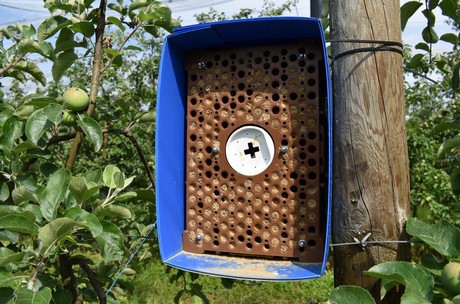 Hotel for Osmia bees
Hotel for Osmia bees
The replanting of hedges, started about 15 years ago by Olivier, also plays an important role in the preservation of this rich biodiversity. “Today, we hear more and more about replanting hedges to create a shelter for auxiliary wildlife. But it is not a new invention. Our parents and grandparents tore down hedges, and here, we have been replanting for more than 15 years. This allows us to build bridges between the wooded and non-wooded areas,” explains Olivier.
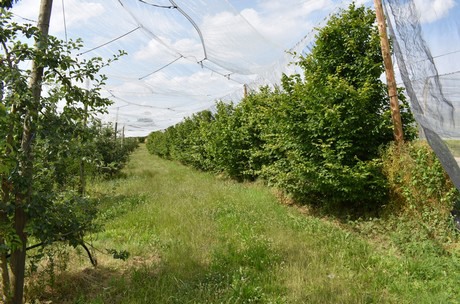 Mature hedge planted in an orchard
Mature hedge planted in an orchard
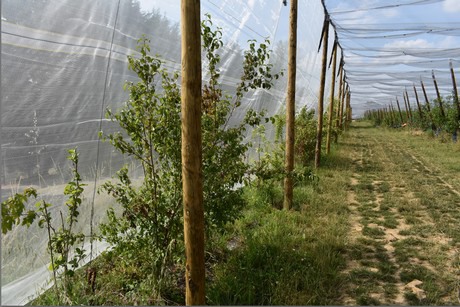 Young hedge
Young hedge
Innovation and knowledge for sustainable management
The orchards do not seem to hold any secrets for Olivier, this fruit-growing enthusiast, who nevertheless tackles the subject with humility. “What is fascinating about this work is that we keep learning every day. There are always new challenges and innovation is a must.”
“For the organic production for example, we select varieties which are naturally resistant to scab, so as to minimize chemical interventions. The organic plots also enable us to identify efficient production techniques, which are both environmentally friendly and profitable, in order to then implement them on the sustainable plots.”
The environment indeed holds an important place in the decision-making of the three partners. “There is a technical issue that is very important today, which is the environmental axis. The days when we treated entire plots for three little flies are over. Not only is it too expensive in terms of input and energy, but it is also completely absurd. We established a system of management per plot, which means that we tackle the problem when it occurs, in the given plot. It requires observation efforts and knowledge,” explains Olivier.
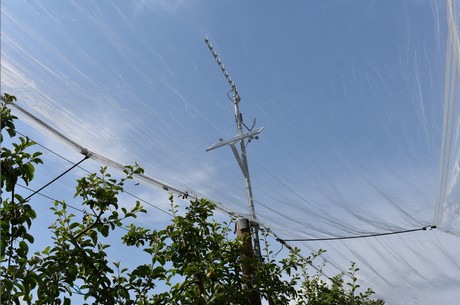 Weather station
Weather station
Equipment on the cutting edge of technology
In order to carry out this management per plot with responsiveness and precision, each site is closely monitored. Weather stations provide continuous information about temperatures, rainfall, wind speed, leaf humidity and even atmospheric pressure. All the plots are equipped with anti-hail nets that regulate, according to their color, the amount of sunshine. As for irrigation, the use of the resource is monitored closely, in order to preserve it to the maximum.
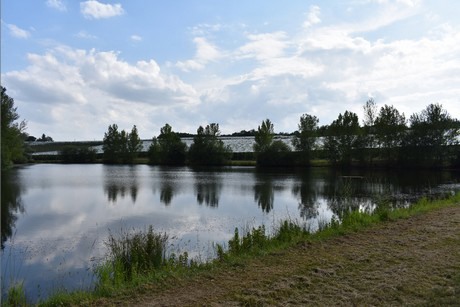 Artificial lake in the middle of the orchards used for irrigation
Artificial lake in the middle of the orchards used for irrigation
A larger and more modern packing station
The packing station certified IFS has two production lines. With a capacity of 8,000 tons of fruits, the building is currently being enlarged and should be ready by the beginning of 2020. Like the orchards, the new station will be modern, with an ecological dimension. “Everything will be automated. In order to minimize our environmental footprint, the heat generated by the cold chambers will be used to dry the apples. We will also be autonomous in terms of energy,” explains Laurent.
With a high degree of expertise both at the agronomical and industrial level, coupled with strong business and management skills, these three partners seem to form an ideal combination to successfully maintain the orchards and the station.
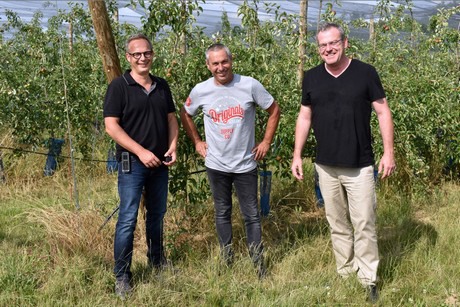 Laurent Martinet, Olivier Dutertre and Christophe Ochs
Laurent Martinet, Olivier Dutertre and Christophe Ochs
For more information:
Albafruit SARL
665 Route de la Megere
82200 Moissac
Phone: +33 (0)5 63 04 60 04
contact@albafruit.fr
www.albafruit.fr
